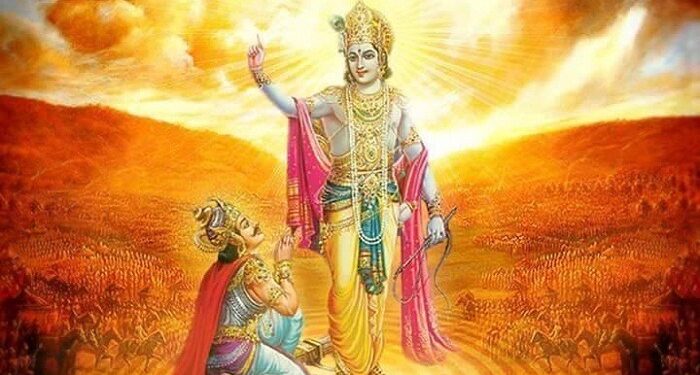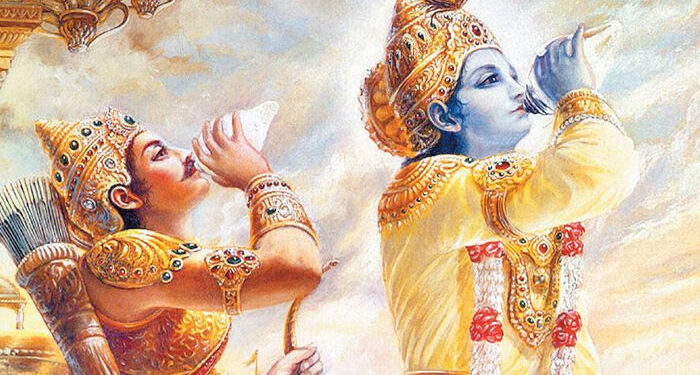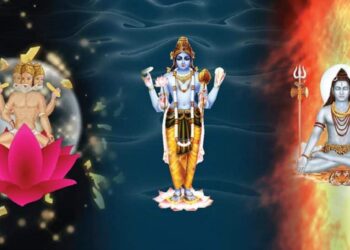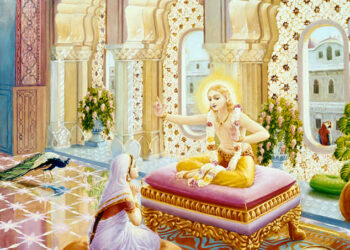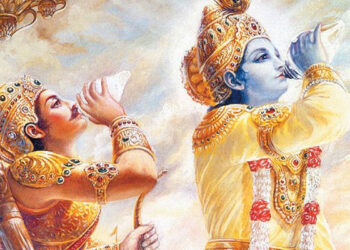TEXT 27
jātasya hi dhruvo mṛtyur
dhruvaṁ janma mṛtasya ca
tasmād aparihārye ‘rthe
na tvaṁ śocitum arhasi
SYNONYMS
jātasya—of one who has taken his birth; hi—certainly; dhruvaḥ—a fact; mṛtyuḥ—death; dhruvam—it is also a fact; janma—birth; mṛtasya—of the dead; ca—also; tasmāt—therefore; aparihārye—of that which is unavoidable; arthe—in the matter; na—do not; tvam—you; śocitum—to lament; arhasi—deserve.
TRANSLATION
One who has taken his birth is sure to die, and after death one is sure to take birth again. Therefore, in the unavoidable discharge of your duty, you should not lament.
PURPORT
One has to take birth according to one’s activities of life. And after finishing one term of activities, one has to die to take birth for the next. In this way one is going through one cycle of birth and death after another without liberation. This cycle of birth and death does not, however, support unnecessary murder, slaughter and war. But at the same time, violence and war are inevitable factors in human society for keeping law and order.
The Battle of Kurukṣetra, being the will of the Supreme, was an inevitable event, and to fight for the right cause is the duty of a kṣatriya. Why should Arjuna be afraid of or aggrieved at the death of his relatives since he was discharging his proper duty? He did not deserve to break the law, thereby becoming subjected to the reactions of sinful acts, of which he was so afraid. By avoiding the discharge of his proper duty, he would not be able to stop the death of his relatives, and he would be degraded due to his selection of the wrong path of action.
TEXT 28
avyaktādīni bhūtāni
vyakta-madhyāni bhārata
avyakta-nidhanāny eva
tatra kā paridevanā
SYNONYMS
avyakta—ādīni—in the beginning unmanifested; bhūtāni—all that are created; vyakta—manifested; madhyāni—in the middle; bhārata—O descendant of Bharata; avyakta—nonmanifested; nidhanāni—when vanquished; eva—it is all like that; tatra—therefore; kā—what; paridevanā—lamentation.
TRANSLATION
All created beings are unmanifest in their beginning, manifest in their interim state, and unmanifest again when annihilated. So what need is there for lamentation?
PURPORT
Accepting that there are two classes of philosophers, one believing in the existence of the soul and the other not believing in the existence of the soul, there is no cause for lamentation in either case. Nonbelievers in the existence of the soul are called atheists by followers of Vedic wisdom. Yet even if, for argument’s sake, we accept this atheistic theory, there is still no cause for lamentation. Apart from the separate existence of the soul, the material elements remain unmanifested before creation. From this subtle state of nonmanifestation comes manifestation, just as from ether, air is generated; from air, fire is generated; from fire, water is generated; and from water, earth becomes manifested. From the earth, many varieties of manifestations take place. Take, for example, a big skyscraper manifested from the earth. When it is dismantled, the manifestation becomes again unmanifested and remains as atoms in the ultimate stage. The law of conservation of energy remains, but in course of time things are manifested and unmanifested—that is the difference. Then what cause is there for lamentation either in the stage of manifestation or in unmanifestation? Somehow or other, even in the unmanifested stage, things are not lost. Both at the beginning and at the end, all elements remain unmanifested, and only in the middle are they manifested, and this does not make any real material difference.
And if we accept the Vedic conclusion as stated in the Bhagavad-gītā that these material bodies are perishable in due course of time (antavanta ime dehāḥ) but that the soul is eternal (nityasyoktāḥ śarīriṇaḥ), then we must remember always that the body is like a dress; therefore why lament the changing of a dress? The material body has no factual existence in relation to the eternal soul. It is something like a dream. In a dream we may think of flying in the sky, or sitting on a chariot as a king, but when we wake up we can see that we are neither in the sky nor seated on the chariot. The Vedic wisdom encourages self-realization on the basis of the nonexistence of the material body. Therefore, in either case, whether one believes in the existence of the soul or one does not believe in the existence of the soul, there is no cause for lamentation for loss of the body.


